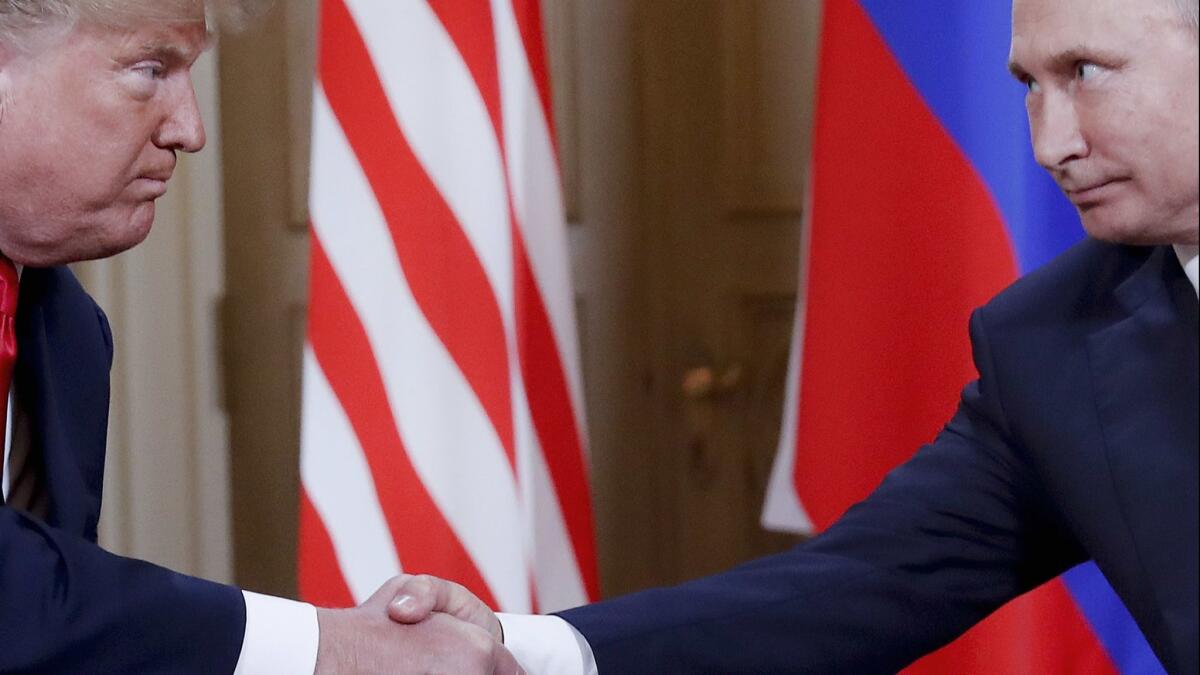Op-Ed: To unravel the Trump/Russia affair, don’t follow the money, follow the lies

- Share via
If the lesson of Watergate was “follow the money,” then the lesson of the Trump/Russia scandal may well be “follow the lies.” As Michael Flynn’s aborted sentencing hearing this week made very clear, he, like almost everyone else caught up in the Russia scandal, purposefully, knowingly did not tell the truth about contacts he had with representatives of the Russian government or its agents. The question is why? The nature of the contacts between the Trump campaign and a hostile foreign power, whatever they were, appear to have been so damning that many risked their careers, their reputations — and even their freedom — to hide it.
Flynn’s lies involve a series of phone calls he had in December 2016 with the Russian ambassador, Sergey Kislyak. President Obama in his final days in office sanctioned Russia for election hacking. Flynn told Kislyak that Russia should not escalate the situation and he urged that the Kremlin only respond in a reciprocal manner. Kislayk told Flynn that Russia agreed to “moderate” its response, but the Kremlin’s restraint was so out-of-character that it reportedly triggered the inquiry into Flynn’s contacts in the first place.
However, when Flynn talked to FBI agents sitting in his White House office days after President Trump’s inauguration, he “stated he did not have a long, drawn-out discussion with KISLYAK where he would have asked him to ‘don’t do something,’” the FBI agents wrote in their memo of the conversations. Flynn apparently told this lie with ease. The FBI agents noted that Flynn “did not give any indicators of deception.”
Almost every denial the president has made about his dealings with Russia has proved to be false.
The Kremlin, of course, knew the truth. And that gave a hostile foreign power potential leverage over the U.S. national security advisor, less than a week into Trump’s term in the White House.
Flynn has never explained his actions. His attorneys avoided the “why” question altogether in their sentencing memo, simply saying Flynn had made “an uncharacteristic error in judgment.” As Flynn was forced to concede before an angry federal judge in Washington on Wednesday, he knew very well that he had lied to the FBI, and that doing so was a crime.
And yet, there was nothing in the exchange with Kislyak, as it has been reported, that goes beyond ordinary foreign policy. It would seem that Flynn could simply have told the FBI agents what appears to be the truth: The incoming Trump administration wanted to change U.S. policy toward Russia, and Flynn was letting Kislyak know it. The fact of the lie, however, suggests this was no ordinary foreign policy matter.
And Flynn has so much company. His deputy, former Fox News commentator K.T. McFarland, revised her “inconsistent” statement to investigators that the Obama administration sanctions didn’t come up in Flynn’s discussions with the Russian ambassador. Campaign aide George Papadopoulos lied to the FBI about his contacts with a shadowy professor who gave him advance warning that the Russians had “dirt” on Hillary Clinton. Trump’s then-lawyer, Michael Cohen, lied to Congress about his contacts during the presidential campaign with the office of a Kremlin spokesman over a proposed Trump Tower in Moscow.
Special counsel Robert S. Mueller III has also accused Trump’s former campaign chairman, Paul Manafort, of lying while he was supposed to be cooperating with the government. We don’t yet know the full details, but given Manafort’s many ties to Russia, his lies too may involve that country.
Let’s not leave President Trump off this list of liars. Almost every denial the president has made about his dealings with Russia has proved to be false. Once, Trump assured us he had nothing to do with Russia; now the president justifies his ongoing business dealings with Russia during the campaign. Once, Trump insisted that no person he deals with has anything to do with Russia; that claim now appears laughable.
Enter the Fray: First takes on the news of the minute from L.A. Times Opinion »
It’s hard to see all these Russia lies as coincidences, given the extraordinary help Russia provided to elect Trump — the hacking of the Democratic National Committee, the WikiLeaks email dumps, the divisive social media messaging that, according to reports released by the Senate on Monday, reached millions of unsuspecting Americans.
Flynn’s case may suggest what Russia got, or hoped to get, in return.
Easing the pressure of U.S. sanctions was a key priority for the Kremlin, and Flynn’s conversation with the Russian ambassador left the impression that the incoming administration would be willing to do just that after the inauguration. Indeed, the Trump administration continues to soften the United States’ approach to Russia, as it did Wednesday when the Treasury Department announced plans to lift sanctions imposed on companies owned by Oleg Deripaska, a Russian oligarch close to Putin who also happens to be one of Manafort’s former business partners.
The agents interviewing Flynn in his White House office pulled on a thread that may lead to extraordinary and perhaps criminal political offenses: an American presidential campaign and a hostile foreign power doing favors for each other. Flynn may have lied, almost reflexively, to keep the plot from unraveling.
One way or another, it will be the Trump administration’s lies about Russia that lead us to the truth.
Seth Hettena is a San Diego-based investigative reporter and the author of “Trump/Russia: A Definitive History.”
Follow the Opinion section on Twitter @latimesopinion and Facebook.
More to Read
A cure for the common opinion
Get thought-provoking perspectives with our weekly newsletter.
You may occasionally receive promotional content from the Los Angeles Times.









